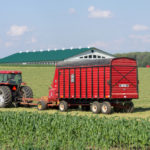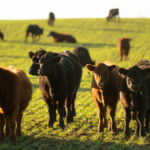Tag Archives sustainability

Crunching numbers on meat sustainability
Improvements in agriculture industry have lowered animal environmental footprint

Cargill-led fund to pay U.S. farmers for carbon capture

When sustainable agriculture isn’t enough
What regenerative agriculture means on the farm, and in the corporate office

Grains sector backed to develop export rejection insurance
Code of practice for 'sustainable' crops also in works

Beef sustainability program expands across the sector
National program gains more traction in Ontario beef value chain

Starbucks to add more plant-based food in latest green push

Opinion: Corporate interest makes sustainability in agriculture tangible
Marketplace initiatives will sink or swim by virtue of consumer support

Sweets, alcohol, not meat common to high carbon households
Science notes: Frequency of restaurant meals were also influential in Japanese study

Building the Canada brand
Better information, more diverse opinions and more flexible policy are key to gaining global advantage: report

Taking the sustainability discussion to the city
An event in Toronto’s centre emphasized the complexity of farm ecosystems

